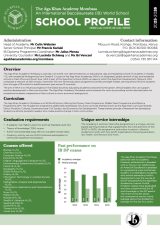Global Politics oral presentations
From 15 to 18 June 2020 Diploma Programme (DP) 1 students gave oral presentations on several topics for their Global Politics course as part of their Internal Assessments. The 10-minute virtual presentations marked one of the many highlights of the Aga Khan Academy’s online learning experience. Nawaf Ali and Faizaan Firoz give more details about the presentations.
The International Baccalaureate (IB) Global Politics course is an extremely engaging subject which explores fundamental concepts such as power, sovereignty, sustainability, peace and conflict.
 Global Politics online session.At Higher Level, students examine two contemporary global political challenges through a case study approach. Students choose from the following topics including, the environment, poverty, health, identity, security and borders. We then proceed to make a case study for each and give a 10-minute presentation to an audience, which is filmed and assessed internally.
Global Politics online session.At Higher Level, students examine two contemporary global political challenges through a case study approach. Students choose from the following topics including, the environment, poverty, health, identity, security and borders. We then proceed to make a case study for each and give a 10-minute presentation to an audience, which is filmed and assessed internally.
We began the semester looking at poverty and its links to development and then moved on to preparing for our oral presentations which have been the main focus for the semester. These presentations required in-depth research and development over three weeks. The process was extremely challenging, requiring a lot of time to be invested by us and our teachers but it was equally rewarding and has allowed us to become confident speakers.
Nawaf Ali: I focused on the topic of borders, and my specific case study was the Somalia vs. Kenya maritime dispute. The dispute has drawn international attention as a result of its potential benefit for the international energy market and the promise of lucrative oil and gas contracts. Global powers like the United States, United Kingdom, France, Italy and Norway are all keen to share in the exploitation of the resource-rich maritime area. I explored whether the conflict would truly benefit Kenya or Somalia and concluded that they both needed each other much more than they needed the contested triangle of maritime territory. They are deeply intertwined and interdependent. These two countries should focus on enhancing their historical ties and economic and security interests for their mutual benefit. Both countries must remain vigilant against external interests that divide the continent and lay its resources bare for exploitation.
Faizaan Firoz: My case study was on the xenophobic attacks in South Africa and I tied it to the global political challenge of security. Xenophobia, which is a type of discrimination, is not given the attention it deserves. Today, discrimination threatens the lives of millions of people; it is therefore a very important issue that has drawn international attention due to the severe abuse of human rights and the trauma it has caused.
Other interesting case studies were the Kuril Islands dispute, the Arctic melt, Pakistan-India Kashmir conflict, the Heathrow airport expansion and the Darfur conflict over water.
 A student making their presentation on Zoom.The most important aspect to understanding Global Politics are the classroom discussions we have during each lesson. However, due to current circumstances, classes were shifted online which is where we’ve been giving our presentations as well. We have been using Zoom and Google Classrooms to continue our lessons and coursework. This process has had its fair share of challenges and benefits, but on the whole, it’s been a learning experience in which our teachers have been very supportive.
A student making their presentation on Zoom.The most important aspect to understanding Global Politics are the classroom discussions we have during each lesson. However, due to current circumstances, classes were shifted online which is where we’ve been giving our presentations as well. We have been using Zoom and Google Classrooms to continue our lessons and coursework. This process has had its fair share of challenges and benefits, but on the whole, it’s been a learning experience in which our teachers have been very supportive.
The importance of the Global Politics course is to enable students to make connections between their lives and the issues that they see and experience around them. It gives them the chance to develop an understanding of the local, national, international and global dimensions of political activity, as well as allow them the opportunity to explore political issues affecting their own lives. Students acquire the skills to explore a variety of different challenges and analyse them through different perspectives.





